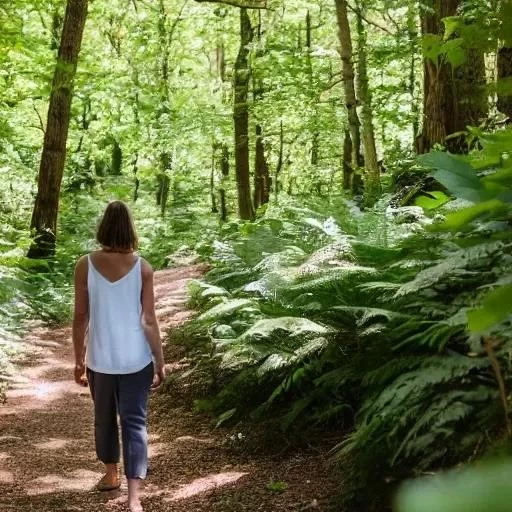Facing a world demanding constant attention and relentless productivity, millions find themselves ensnared in the pervasive net of anxiety, a silent epidemic affecting individuals across every demographic. The relentless hum of digital notifications, the weight of economic pressures, and the sheer pace of modern life often conspire to leave us feeling perpetually on edge, caught in an exhausting cycle of worry and apprehension. Yet, amidst this modern maelstrom, a remarkably accessible and profoundly effective remedy awaits, not in a pill bottle or a therapist’s couch, but just beyond the trailhead: hiking.
Far more than mere physical exercise, embarking on a hike offers a profound psychological reset, providing an unparalleled opportunity to disconnect from the digital cacophony and reconnect with something ancient and essential: nature itself. From the moment one steps onto a winding path, the senses are gently yet powerfully re-engaged, replacing urban stressors with the rustle of leaves, the scent of pine, and the vast, calming canvas of the natural world. A burgeoning body of research, spanning neuroscience to environmental psychology, is now unequivocally highlighting how this simple act of walking in nature is not just a pleasant pastime, but a potent, scientifically-backed intervention for alleviating the persistent grip of anxiety and fostering enduring mental well-being.
| Aspect | Description & Benefit | Scientific Basis (Brief) |
|---|---|---|
| Stress Hormone Reduction | Exposure to natural environments significantly lowers levels of cortisol and adrenaline, the primary stress hormones, promoting physiological calm. | Studies consistently show reduced physiological markers of stress, including lower heart rates and blood pressure, after spending time in green spaces. |
| Mood & Well-being Boost | Physical exertion during hiking releases endorphins, natural mood lifters, while consistent sunlight exposure aids serotonin production and regulates circadian rhythms. | “Green exercise” is strongly linked to decreased symptoms of depression and anxiety, fostering feelings of happiness, vitality, and overall life satisfaction. |
| Enhanced Mindfulness & Focus | The sensory richness of nature encourages present-moment awareness, diverting attention from anxious rumination and mental clutter. | “Involuntary attention” (being drawn to nature’s beauty) restores directed attention capacity, improving focus, problem-solving skills, and mental clarity. |
| Improved Sleep & Physical Health | Regular physical activity and exposure to natural light during hiking help regulate sleep-wake cycles, leading to more restorative sleep. | Consistent hiking strengthens cardiovascular health, boosts immunity, reduces inflammation, and contributes to overall physical resilience, which directly impacts mental well-being. |
For further scientific insights into nature’s therapeutic power, visit: Association of Nature & Forest Therapy
Nature’s Soothing Embrace: The Science of Serenity
The therapeutic power of nature, often dubbed “forest bathing” or Shinrin-yoku in Japan, is increasingly understood through a scientific lens; When we immerse ourselves in natural environments, our bodies respond almost immediately. Studies published in journals like Environmental Health Perspectives have demonstrated that even brief interactions with green spaces can significantly lower levels of cortisol, the body’s primary stress hormone, and reduce sympathetic nervous system activity, which is responsible for the “fight or flight” response. This physiological shift is not merely imagined; it’s a measurable reduction in the biological markers of stress, paving the way for profound mental relaxation. The fresh air, often rich with phytoncides (airborne chemicals emitted by plants and trees), is also believed to boost immune function and reduce anxiety.
The Rhythmic Remedy: Movement as Meditation
Beyond the passive benefits of simply being in nature, the active component of hiking delivers its own powerful punch against anxiety. The rhythmic, repetitive motion of walking, especially uphill and downhill, acts as a form of moving meditation. This sustained, moderate physical exertion triggers the release of endorphins, the body’s natural mood elevators, creating a sense of euphoria often referred to as a “runner’s high,” but equally achievable on a long walk. By engaging the body in this intentional, grounding activity, nervous energy is effectively dissipated, providing a healthy outlet for pent-up stress and worry. As Dr. Eva M. Selhub, a clinical associate in medicine at Harvard Medical School, persuasively argues, “Exposure to nature, combined with exercise, is incredibly effective at improving mental health outcomes.”
Cultivating Mindfulness and Perspective
One of the most insidious aspects of anxiety is its tendency to trap us in cycles of rumination, replaying past perceived failures or catastrophizing future scenarios. Hiking offers a remarkable escape from this mental prison. The very act of navigating varied terrain, observing wildlife, or simply noticing the play of light through the canopy compels present-moment awareness. Your mind becomes absorbed in the immediate, sensory-rich experience: the crunch of gravel underfoot, the vibrant hues of wildflowers, the feeling of a cool breeze. This involuntary attention to the external world interrupts the cycle of negative thought patterns, allowing the mind to rest and reset. Furthermore, the expansive views from a summit or the sheer scale of ancient forests can provide a powerful shift in perspective, making personal problems feel less overwhelming in the grand scheme of things.
A Path Towards Lasting Resilience
Embracing hiking as a regular practice is not merely a temporary fix; it’s an investment in long-term mental resilience. Consistently engaging with natural environments and physical activity strengthens neural pathways associated with positive emotional regulation, enhances cognitive function, and significantly improves sleep quality – a critical factor often disrupted by anxiety. By integrating insights from environmental psychology and exercise physiology, we understand that hiking empowers individuals with a tangible, self-directed tool for managing their mental health. It builds confidence, fosters a sense of accomplishment, and reconnects us with an inherent sense of belonging to the natural world, all contributing to a more optimistic, forward-looking outlook on life.
So, the next time anxiety threatens to overwhelm, consider stepping away from the screens and towards the trails. The profound peace, clarity, and renewed energy awaiting you are not just anecdotal; they are the scientifically validated gifts of the great outdoors. Hiking isn’t just a walk; it’s a journey towards a more balanced, resilient, and joyful self, transforming your relationship with anxiety one purposeful step at a time. The path to serenity is there, waiting for you to discover its incredibly effective healing power.






